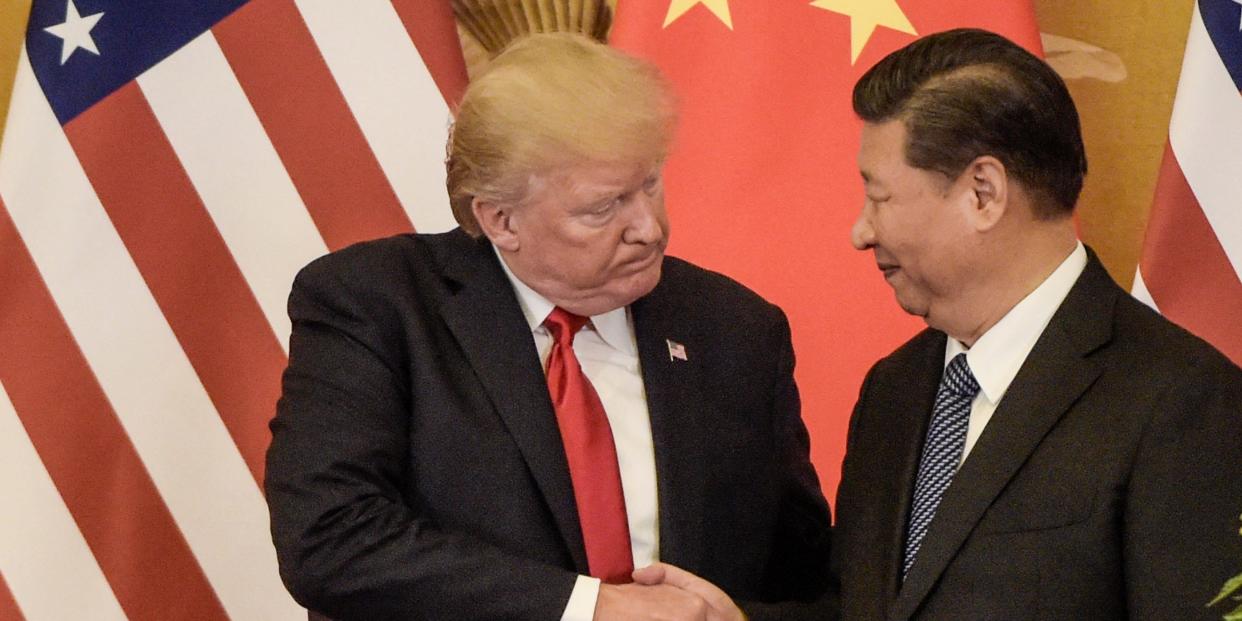Trump says he wants huge tariffs if elected. That could send inflation spiking.

Trump has plans for at least a 10% universal tariff on US imports, he told Time Magazine.
He argues that such a levy wouldn't lead to increased inflation.
But research from the bipartisan Tax Foundation suggests otherwise, and says Trump's 2018 trade war was also economically damaging.
Former President Donald Trump has made it no secret that he plans to build a wall of tariffs around the US, with higher rates applied to those he sees standing in the way of American trade.
If elected, his proposed measures include a 10% universal duty on all imports headed into the country, though Trump recently told Time Magazine this figure could reach even higher.
China could face a tariff as high as 60%, which Trump argues will bring back production to US shores.
"I call it a ring around the country ... A reciprocal tax also," the Republican candidate said in a wide-ranging interview with the outlet. "And if we do that, the numbers are staggering."
But historical precedence has shown that tariffs can lead to surging inflation, something the Time interviewer brought up to Trump, who was quick to shrug it off.
"I don't believe it will have much of an effect because they're making so much money off of us," he said. "I also don't believe that the costs will go up that much."
The non-partisan Tax Foundation would beg to differ. Their research shows that duties on imports force traders to either raise their prices or pull their product entirely, which also pushes prices higher because supply is diminished.
Further, tariffs also boost the cost of parts and materials, adding price pressure on the final product, even if made in the US, the foundation found.
But Trump refutes this: "I don't believe it'll be inflation. I think it'll be lack of loss for our country."
In his view, countries such as China, India, and Brazil take advantage of the US, by barring American products while at the same time looking to boost domestic production of these same goods.
"I think what happens is you build. What happens to get out of the whole situation is you end up building, instead of having your product brought in from China, because of that additional cost, you end up making the product in the United States," he added later.
Still, when taking a look at Trump's 2018 tariff policies against Beijing, price hikes are among the lasting consequences. Tax Foundation estimates that the tariffs then imposed have amounted to an $80 billion tax increase on Americans.
"Look, I took in billions of dollars from China. Nobody else ever did anything on China," Trump explained. "I also let people know what the threat of China was. China was going along making $500 to $600 billion a year and nobody was ever even mentioning it until I came along."
To be sure, a majority of Trump's restrictions have stayed in place under the current Biden administration; the institute calculated that these remaining tariffs could reduce long-run GDP by 0.21%.
More tariffs under Trump could be poorly timed, as US monetary policy is already struggling to clamp down on current inflation levels. Recent hotter-than-expected data has even amplified worries of a stagflationary scenario, in which the Federal Reserve would have to raise interest rates to pressure down pricing.
But Trump allies are reported to be discussing ways in which the former president could take control of the central bank, in an effort to ensure lower rates. However, any attempt to threaten Fed independence would risk an investor backlash, Harvard economist Kenneth Rogoff recently said.
Read the original article on Business Insider
